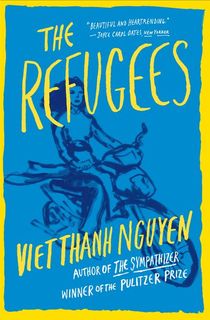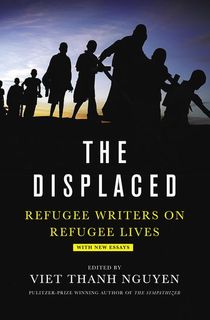Born in Vietnam in 1971, Viet Thanh Nguyen and his family came to the United States as refugees in 1975. His works explore the challenges and realities faced by refugees, both in the fiction and non-fiction arenas. His prolific oeuvre spans anthologies, children’s books, novels, and short stories. His debut novel, The Sympathizer, won the Pulitzer Prize in 2016.
Whether you’re interested in, unfamiliar with, or looking to revisit Nguyen’s work, this list has what you’re looking for.

The Sympathizer
Nguyen’s Pulitzer Prize winning novel is told from the point of view of an unnamed narrator. Tracing back the events of 1975, The Sympathizer is told in the midst of an uproarious time in Saigon, Vietnam. The narrator, who calls himself the Commandant, is a half-French, half-Vietnamese spy working with the Communist forces in North Vietnam. The narrator’s mentor, Claude, is a Central Intelligence Agent that escaped the fall of Saigon with his wife.
The narrator compiles a list of the other passengers that may be able to board their plane, including his own brother, his brother’s wife, and their son. When the appointed airfield is attacked, he leaves behind his brother and his family in favor of escaping to the United States. Once he’s arrived, he faces fetishization and racism particular to the States, and gets a job working for the Department of the Chair at Occidental College. The Commandant chases different opportunities in different countries, exploring the portrayals of the Vietnam War from different perspectives.

The Committed
In this sequel to The Sympathizer, The Committed continues to follow the story of the Commandant in his globe-trotting attempts to make a new place for himself in the world. He has relocated to France, taking on the identity of Vo Danh—Nameless. He reaches Paris in the summer of 1981, and quickly finds himself embroiled in business with a gangster known as The Boss.
As he finds himself torn between his old and new identities, and his places in the Communist and Capitalist societies, his personalities and relationships become fractured. Where he once fought for a political cause, he now fights for control of the free market, determined to identify the winning side between the patriarchal and capitalist overlords, and the underground gangsters.

Nothing Ever Dies
Nothing Ever Dies delves into the lasting effects of war, both on the homeland that it took place in, and the diaspora. Nguyen delves into the way that society and history tend to glamorize brutal pasts, with a focus on the Vietnam War.
It looks at the responsibility that society has to fully recognize and understand the Vietnamese, Cambodian, and Laotian victims, both as civilians and as soldiers. Ngyuen also gives insight into the identity and struggles that Vietnamese refugees face, adjusting or losing their national identity in the wake of conflict.

The Refugees
This collection has eight of Nguyen’s short stories, including “Black-Eyed Woman,” “War Years,” “The Americans,” and “Fatherland.” The settings of the stories span from Vietnam to California, examining the love, hope, loss, and difficulties faced by Vietnamese refugees.
A ghostwriter wracked with survivor's guilt is visited by the ghosts of their past. A young boy’s time is split between summer school, and working at the convenience store that his parents own. A terminally ill man stores his neighbor’s counterfeit goods to return a favor. A young woman visits Vietnam, meeting the family that she was raised apart from, and shares a secret with a sister that she’s never known.

Chicken of the Sea
Three chickens decide to leave the only life they’ve ever known in favor of the high seas, seeking fame and fortune. They become part of a pirate crew on the Pitiless, and take the treacherous journey to the island of the Dog Knights, experiencing more adventure than a chicken typically bargains for.

The Displaced
In the wake of one of Donald Trump’s infamous executive orders, banning refugees from Iran, Libya, North Korea, Somalia, Syria, Venezuela, and Yemen, Nguyen brings together refugee writers from various walks of life. In the time between the publishing of this book, the international refugee crisis has only increased. The Displaced contains twenty essays from seventeen authors.
Many of the authors live in the United States, though a few discuss refugee live in countries like Thailand and South Africa. Whether they’re asylum seekers or displaced as a result of war, each essay carries a unique perspective of life as a refugee.

Trans Pacific Studies: Framing an Emerging Field
In Trans Pacific Studies: Framing an Emerging Field, anthropologists, sociologists, geographers, and critics challenge the prototypical Western ideas held about the Pacific region. It explores the ways in which European and American contact with this area has led to the renaming and cultural framing of this area, starting in the sixteenth century, and continuing to this day. This anthology breaks the Transpacific studies into three distinct parts: Theories of the Transpacific, Transpacific Culture, and Transpacific Populations.
Theories of the Transpacific includes the topics of the studies’ views from an Asian perspective, the Transpacific Cold War, and the place of the Chinese State in Transpacific relations. Transpacific Culture examines the evolution of the Transpacific from 1939-1940, the lens of American Imperialism on Transpacific studies, and the Transpacific Diaspora. The final part, Transpacific Populations, delves into the perception of the Transpacific in film, the Vietnamese refugee’s migration to the United States, and commerce in the Vietnamese Diaspora.

Race and Resistance: Literature and Politics in Asian America
Part of the Race and Culture in American Culture series, Nguyen explores how Asian-American literature has affected the American perception of its people. The analyzed works span from the early 1900s through the 2000s, offering an evolving perspective of the Asian-American identity over the course of a century.

Go Home!
With pieces by over twenty authors, including Alexander Chee, Kimiko Hahn, Alice Sola Kim, Mohja Kim, Wendy Zu, Sharlene Teo, and Wo Chan, Go Home examines the state of the Asian diasporic notion of home and belonging. This collection includes works of poetry, fiction, and memoir, as well as a foreword by Nguyen.






